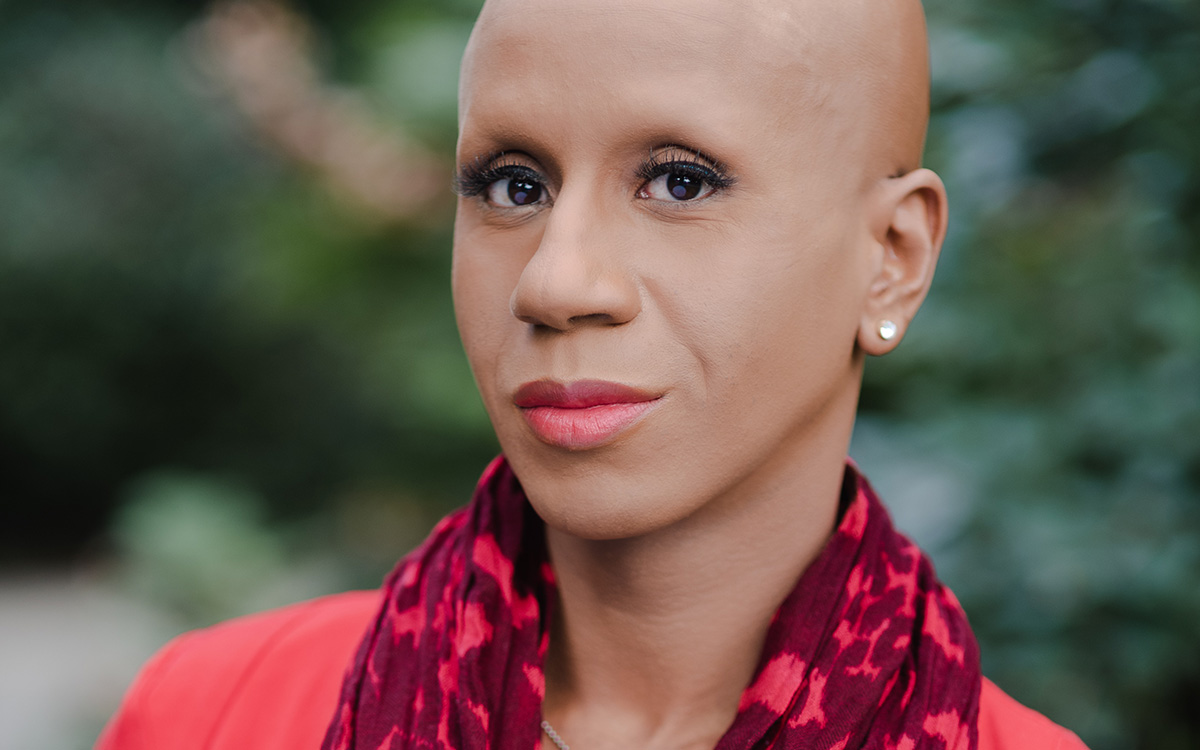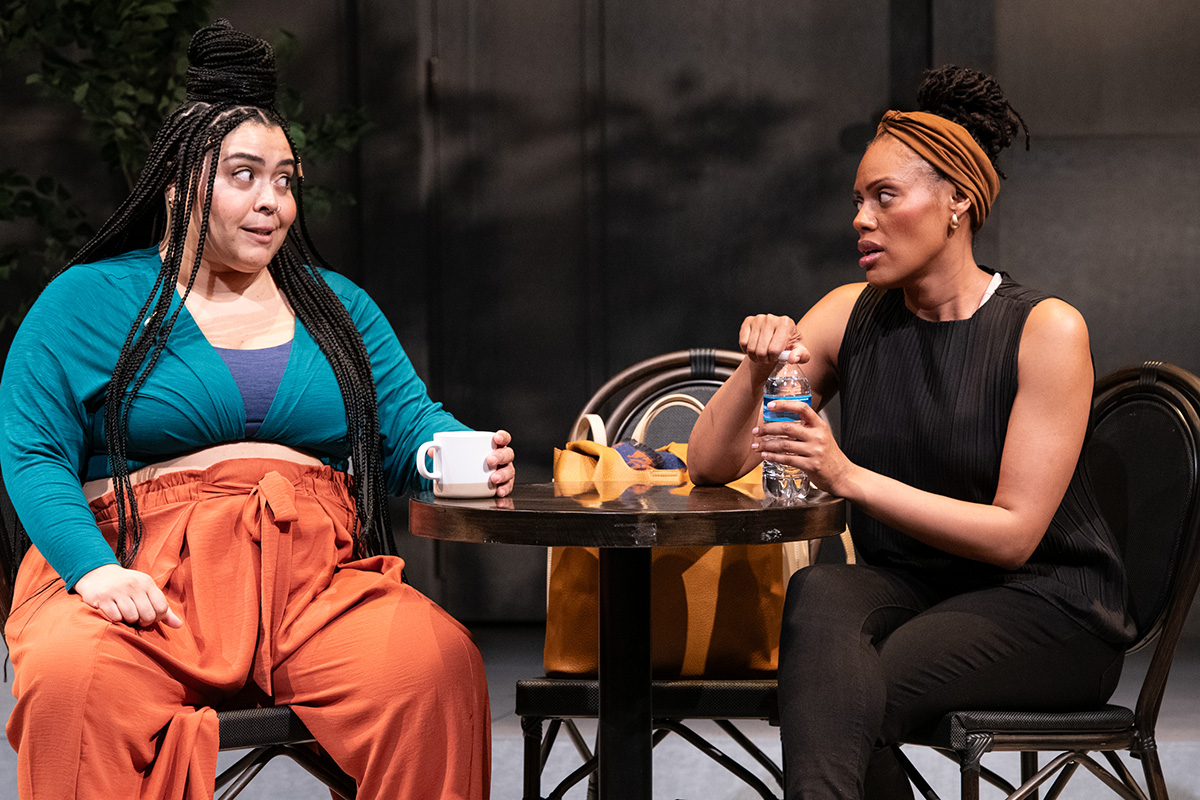Theater
Page-to-Stage theater fest returns this weekend to Kennedy Center
LGBT themes well represented among 80-odd performances slated


Playwright Audrey Cefaly says her characters reveal their sexual orientation to her as she discovers them. (Photo courtesy Kennedy Center)
Page-to-Stage New Play Festival
Sept. 1-3
The Kennedy Center
2700 F St., N.W,
Free
This Labor Day weekend marks 17 years since the debut of Page-to-Stage New Play Festival, the Kennedy Center-sponsored annual event celebrating new works in progress. This year also promises to be its largest to date with about 60 area theatrical companies participating in almost 80 performances.
“There’ll be a lot going on all over the building,” says Diana Ezerins, director of public programming at the Kennedy Center. “Theaters and artists will present open rehearsals, concert readings and workshops of new plays that are often still in the development phase. There will be music, comedy, serious things and shows for young people. It’s very festive. Admission is free. And we’re pretty stoked because we’re trying to make sure the schedule represents the four different quadrants of our city.”
Page-to-Stage was hatched after a number of local companies lobbied for a platform to test new work that might or might not be part of their season lineups. Over the years it’s grown to become an important part of the Kennedy Center’s public programs and community engaging programming activities. It typically proves a terrific platform for risk-taking and experimentation. And it’s practical in that it brings far-flung companies under one centrally located roof. Offerings have grown increasingly diverse in both themes and players.
Because the performances are in the workshop stage, many of the plays feature actors at music stands reading from scripts. Participating theaters include Theater Alliance of Washington, Mosaic Theater Company, The Kennedy Center and Signature Theatre to name a few. Among the vast lineup, many performances are of special interest to LGBT audiences.
Unexpected Stage Company is presenting “Tell Me Something Good” (Saturday at 4 p.m. Chinese Lounge), a collection of shorts, written and directed by D.C. playwright Audrey Cefaly. The collection includes “Consider the Ficus,” the story of D.C. couple Garrison, an environmental lawyer, and Nate, an editor, whose relationship blows up the very day the Supreme Court legalizes same-sex marriage.
Cefaly is probably best known for her play “The Gulf,” winner of the Lambda Literary Award in the category of LGBT drama. Set on a tiny fishing boat in the Alabama delta, this intriguing two hander explores the tumultuous relationship of lesbian couple Betty and Kendra. The play premiered in 2016 at Signature Theatre with a compelling production directed by out director Joe Calarco and has since been produced in England and Australia.
Though not gay herself, Cefaly’s lesbian working-class characters ring exceptionally true — them, their situations and their plainspoken yet gloriously lyrical dialogue. While writing the play, Cefaly ran some things by lesbian friends. She wanted to make sure she got it right.
“I don’t set out to write gay or lesbian characters,” she says. “I hear the voices as they come. Sometimes the characters reveal themselves as same-sex couples like with ‘The Gulf.’ The first image in my head was two women in a boat fighting. It reveals itself to me and try to do right by that.”
She adds that while all people need to see themselves reflected on stage, she looks forward to the day when identifying a play as gay won’t be particularly noteworthy.
“One day, you’ll see a play and it’s just another beautiful love story and the qualifier ‘lesbian’ or ‘gay’ won’t be necessary,” she says. “I hope by adding my pieces to the queer canon it will help a little.”
The African-American Collective Theater (ACT), a longtime Page-to-Stage participant, continues its exploration of LGBT life in the black community with “Unprotected Sex” (Saturday at 7:30 p.m., Terrace Gallery). Penned and directed by out playwright Alan Sharpe, the work is described as “an edgy collection of short plays reflecting the serious, sexy, and sometimes silly challenges encountered while navigating the path through self-awareness and self-acceptance.”
“Despite the title, the collection of shorts isn’t about HIV/AIDS,” Sharpe says. “It’s more about the way in which LGBTQ people’s sexuality has not been recognized as particularly valid or valuable. When I was growing up in ‘60s, there was no one you could go to. No Internet. Very little in sense of protection. Couldn’t go to a pastor, counselor, family or friends. You felt very alone. And that’s the jumping-off piece for the project.”
Sharpe says the festival has multiple benefits.
“The raison d’etre of Page-to-Stage is to show works in progress and give an idea of what your work does,” he says. “Some are finished, some aren’t. People who turn up for these performances are a cross section in a way that we don’t experience at ACT, so this is a nice way to sound out material and get diverse response. If you preach to the choir you become insulated.”
For a complete list of shows, dates and times go here.
Theater
Miss Kitty tackles classical mythology in ‘Metamorphoses’
Folger production seen through the lens of the African diaspora

‘Metamorphoses’
May 7-June 16
Folger Theatre
201 East Capitol St., S.E.
$20-$84
Folger.edu
Miss Kitty’s words are thoughtful and measured, occasionally punctuated by flamboyant flourishes and uplifting proclamations. Her tried and tested tagline is “live in fierce not fear.”
She describes herself as “AMAB (assigned male at birth), nonbinary, genderqueer, transfemme” as well as “chanteuse, noble blacktress, and dancer.”
Currently, Miss Kitty is testing her talents in Mary Zimmerman’s “Metamorphoses” at Folger Theatre on Capitol Hill.
At 90 minutes, “Metamorphoses,” is made up of interwoven vignettes from classical mythology including the tales of Midas and his daughter, Alcyone and Ceyx, and Eros and Psyche.
“It’s all stories that relate to the human condition: the follies, the happiness, the love, the loss,” Miss Kitty explains. “And a thorough knowledge of mythology isn’t a requirement for enjoyment.”
The language is contemporary and with its 11-person ensemble cast – comprised exclusively of Black or indigenous people of color – they’re adding their own spin to its present-day feel, she adds.
In Zimmerman’s famously staged premiere production, the actors performed in and around a pool of water. At Folger, director Psalmayene 24 has ditched actual aquatics; instead, he suggests the element by introducing Water Nymph, a new character constructed around Miss Kitty.
Water Nymph doesn’t speak, but she’s very visible from the opening number and throughout the play on stage and popping up in unexpected places around the venue.
“It’s a lot of dancing; I haven’t danced the way Tony Thomas is choreographing me in a very long time. At 40, can she still make theater with just my body as her instrument?
The name “Miss Kitty” was born over a decade ago.
Miss Kitty recalls, “She was still presenting as male and going by her dead name. Someone commented that with the wig she was wearing for a part, she looked like Eartha Kitt whom she deeply admires.”
Her penchant for illeism (referring to oneself in third person) isn’t without good reason. She explains, “It’s to reiterate that however she might look, she’s always there; and if you misgender, she will let you know.”
Initially, the moniker was a drag persona at Capital Pride or the occasional fabulous cabaret performance at a nightclub.
But as time passed, she realized that Miss Kitty was something she couldn’t take off. She had always been a part of her.
“She’s helped me to grow and flourish; she’s given me the strength that I never would have had before. I’m so proud of myself for realizing that before it was too late.”
Bringing Miss Kitty into her theatrical career presented some concerns. Would theater folks be open to the new her, especially those she’d worked with before?
Not always, but she’s found new companies who’ve welcomed Miss Kitty with open arms including Avant Bard, Spooky Action Theater, and now Folger.
Last fall, Miss Kitty appeared in Spooky Action’s Agreste (Drylands), a stunning queer story penned by gay Brazilian playwright Newton Moreno.
After being invited to audition and reading the script, Miss Kitty was determined to be a part of the production.
A work dealing with love and being trans, and transphobia, and how people can turn on a dime once they learn the truth about someone, resonated deeply with the actor.
“The play speaks to the idea that if people just let people be who they are and love who they want to love we’d all be a lot happier,” she says.
For her sublime efforts, Miss Kitty nabbed a Helen Hayes Award nomination in the Outstanding Lead Performer category (winner to be determined on Monday, May 20 during a ceremony at The Anthem).
It’s her first time nominated and first time attending. She’s thrilled.
Miss Kitty grew up in Oxen Hill, Md., and now lives near Washington Harbor. Her entry into performance was through music followed by high school plays. She graduated from Catholic University with a degree in music/concentration in musical theater, and from there dove directly into showbiz.
Looking back, Miss Kitty says, “being a person of color AND queer can be a double whammy of difficulty. You have to live in light and do the things you’re afraid to do. That’s the game changer.”
Presenting “Metamorphoses” through the lens of the African diaspora (the cast also includes Jon Hudson Odom and Billie Krishawn, among others) helps us to realize that every story can be universal, especially for marginalized people — South Asian, Native American, or fully queer perspectives, she says.
“Having an all-Black ensemble opens all new worlds for everyone.”
Theater
Round House explores serious issues related to privilege
‘A Jumping-Off Point’ is absorbing, timely, and funny

‘A Jumping-Off Point’
Through May 5
Round House Theatre
4545 East-West Highway, Bethesda, Md.
$46-$83
Roundhousetheatre.org
In Inda Craig-Galván’s new play “A Jumping-Off Point,” protagonist Leslie Wallace, a rising Black dramatist, believes strongly in writing about what you know. Clearly, Craig-Galván, a real-life successful Black playwright and television writer, adheres to the same maxim. Whether further details from the play are drawn from her life, is up for speculation.
Absorbing, timely, and often funny, the current Round House Theatre offering explores some serious issues surrounding privilege and who gets to write about what. Nimbly staged and acted by a pitch perfect cast, the play moves swiftly across what feels like familiar territory without being the least bit predictable.
After a tense wait, Leslie (Nikkole Salter) learns she’s been hired to be showrunner and head writer for a new HBO MAX prestige series. What ought to be a heady time for the ambitious young woman quickly goes sour when a white man bearing accusations shows up at her door.
The uninvited visitor is Andrew (Danny Gavigan), a fellow student from Leslie’s graduate playwriting program. The pair were never friends. In fact, he pressed all of her buttons without even trying. She views him as a lazy, advantaged guy destined to fail up, and finds his choosing to dramatize the African American Mississippi Delta experience especially annoying.
Since grad school, Leslie has had a play successfully produced in New York and now she’s on the cusp of making it big in Los Angeles while Andrew is bagging groceries at Ralph’s. (In fact, we’ll discover that he’s a held a series of wide-ranging temporary jobs, picking up a lot of information from each, a habit that will serve him later on, but I digress.)
Their conversation is awkward as Andrew’s demeanor shifts back and forth from stiltedly polite to borderline threatening. Eventually, he makes his point: Andrew claims that Leslie’s current success is entirely built on her having plagiarized his script.
This increasingly uncomfortable set-to is interrupted by Leslie’s wisecracking best friend and roommate Miriam who has a knack for making things worse before making them better. Deliciously played by Cristina Pitter (whose program bio describes them as “a queer multi-spirit Afro-indigenous artist, abolitionist, and alchemist”), Miriam is the perfect third character in Craig-Galván’s deftly balanced three-hander.
Cast members’ performances are layered. Salter’s Leslie is all charm, practicality, and controlled ambition, and Gavigan’s Andrew is an organic amalgam of vulnerable, goofy, and menacing. He’s terrific.
The 90-minute dramedy isn’t without some improbable narrative turns, but fortunately they lead to some interesting places where provoking questions are representation, entitlement, what constitutes plagiarism, etc. It’s all discussion-worthy topics, here pleasingly tempered with humor.
New York-based director Jade King Carroll skillfully helms the production. Scenes transition smoothly in large part due to a top-notch design team. Scenic designer Meghan Raham’s revolving set seamlessly goes from Leslie’s attractive apartment to smart cafes to an HBO writers’ room with the requisite long table and essential white board. Adding to the graceful storytelling are sound and lighting design by Michael Keck and Amith Chandrashaker, respectively.
The passage of time and circumstances are perceptively reflected in costume designer Moyenda Kulemeka’s sartorial choices: heels rise higher, baseball caps are doffed and jackets donned.
“A Jumping-Off Point” is the centerpiece of the third National Capital New Play Festival, an annual event celebrating new work by some of the country’s leading playwrights and newer voices.
Theater
‘Amm(i)gone’ explores family, queerness, and faith
A ‘fully autobiographical’ work from out artist Adil Mansoor

‘Amm(i)gone’
Thorough May 12
Woolly Mammoth Theatre
641 D St., N.W.
$60-$70
Woollymammoth.net
“Fully and utterly autobiographical.” That’s how Adil Mansoor describes “Amm(i)gone,” his one-man work currently playing at Woolly Mammoth Theatre.
Both created and performed by out artist Mansoor, it’s his story about inviting his Pakistani mother to translate Sophocles’s Greek tragedy “Antigone” into Urdu. Throughout the journey, there’s an exploration of family, queerness, and faith,as well as references to teachings from the Quran, and audio conversations with his Muslim mother.
Mansoor, 38, grew up in the suburbs of Chicago and is now based in Pittsburgh where he’s a busy theater maker. He’s also the founding member of Pittsburgh’s Hatch Arts Collective and the former artistic director of Dreams of Hope, an LGBTQ youth arts organization.
WASHINGTON BLADE: What spurred you to create “Amm(i)gone”?
ADIL MANSOOR: I was reading a translation of “Antigone” a few years back and found myself emotionally overwhelmed. A Theban princess buries her brother knowing it will cost her, her own life. It’s about a person for whom all aspirations are in the afterlife. And what does that do to the living when all of your hopes and dreams have to be reserved for the afterlife?
I found grant funding to pay my mom to do the translation. I wanted to engage in learning. I wanted to share theater but especially this ancient tragedy. My mother appreciated the characters were struggling between loving one another and their beliefs.
BLADE: Are you more director than actor?
MANSOOR: I’m primarily a director with an MFA in directing from Carnegie Mellon. I wrote, directed, and performed in this show, and had been working on it for four years. I’ve done different versions including Zoom. Woolly’s is a new production with the same team who’ve been involved since the beginning.
I love solo performance. I’ve produced and now teach solo performance and believe in its power. And I definitely lean toward “performance” and I haven’t “acted” since I was in college. I feel good on stage. I was a tour guide and do a lot of public speaking. I enjoy the attention.
BLADE: Describe your mom.
MANSOOR: My mom is a wonderfully devout Muslim, single mother, social worker who discovered my queerness on Google. And she prays for me.
She and I are similar, the way we look at things, the way we laugh. But different too. And those are among the questions I ask in this show. Our relationship is both beautiful and complicated.
BLADE: So, you weren’t exactly hiding your sexuality?
MANSOOR: In my mid-20s, I took time to talk with friends about our being queer with relation to our careers. My sexuality is essential to the work. As the artistic director at Dreams of Hope, part of the work was to model what it means to be public. If I’m in a room with queer and trans teenagers, part of what I’m doing is modeling queer adulthood. The way they see me in the world is part of what I’m putting out there. And I want that to be expansive and full.
So much of my work involves fundraising and being a face in schools. Being out is about making safe space for queer young folks.
BLADE: Have you encountered much Islamophobia?
MANSOOR: When 9/11 happened, I was a sophomore in high school, so yes. I faced a lot then and now. I’ve been egged on the street in the last four months. I see it in the classroom. It shows up in all sorts of ways.
BLADE: What prompted you to lead your creative life in Pittsburgh?
MANSOOR: I’ve been here for 14 years. I breathe with ease in Pittsburgh. The hills and the valleys and the rust of the city do something to me. It’s beautiful, it’ affordable, and there is support for local artists. There’s a lot of opportunity.
Still, the plan was to move to New York in September of 2020 but that was cancelled. Then the pandemic showed me that I could live in Pittsburgh and still have a nationally viable career.
BLADE: What are you trying to achieve with “Amm(i)gone”?
MANSOOR: What I’m sharing in the show is so very specific but I hear people from other backgrounds say I totally see my mom in that. My partner is Catholic and we share so much in relation to this.
I hope the work is embracing the fullness of queerness and how means so many things. And I hope the show makes audiences want to call their parents or squeeze their partners.




















